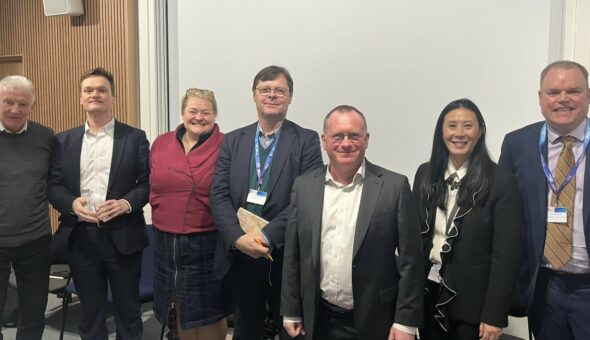In October, we met for the second event in our Feminist seminar series organised by Dr Sarah Glozer, Dr Deborah Brewis and Professor Nancy Harding. This session, focused on writing and researching differently, saw Nancy Harding take us through new frontiers of feminist thinking and Deborah Brewis introduce ‘Writing Differently’. The session ended with an opportunity for collective reflection via a ‘writing differently’ exercise. Here we highlight current thinking on how management writing may be better humanised.
The Centre for Business, Organisations and Society (CBOS) and the Future of Work (FoW) are currently running a series of seminars on feminist thinking. Aiming to explore developments in feminist thought in a relaxed atmosphere, the seminars hope to build a community among those with shared interests within the School of Management, and beyond.
In our second event of the series, we considered how we represent the world in which we live through the way we write. Writing is an essential exercise in constructing (feminist) realities and so reflecting on not only the way we communicate knowledge, but also the processes through which we write, encourages us to ‘write differently’. Nancy Harding and Deborah Brewis have both been active in pioneering this set of methods; an area in which management and organisation studies is leading the way. Deborah took us through some of the key developments so far, and shared ideas and advice on how to get started.
Writing differently
Scientific articles are important ways in which we communicate knowledge generated through research and generally are prepared in accordance with certain stylistic and intellectual conventions. These conventions have emerged over time and have been imported into management and organisation studies from other disciplines such as the natural sciences. We have been socialised into particular ways of doing things as researchers throughout the research process including the ways in which we conceive of ideas that are worthy of investigation, the methods we see as useful in conducting research, and the ways in which we consider legitimate ‘scientific’ ways to write up research. Many of these practices are helpful in communicating clearly and expediently. However, if we consider the multiplicity of human experiences that we are seeking to capture through our research, and thus communicate to others – the stories, hopes, memories and feelings embedded within our subject matter and indeed ourselves as researchers – we can often see a distance between the richness of life and how it feels to engage with scientific writing. In these cases, we can critique scientific writing for its tendencies to speak with a ‘voice from nowhere’, to make grandiose claims, and to be disembodied in character.
It is for this reason that writing differently encourages us to write with greater passion and beauty in order to get closer to the truth of human experience. The challenge to write differently is a challenge to humanise writing through experimenting with the ‘classic’ scientific form. It is within this vein that management scholars have called for more embodied approaches to writing that are dialogic, autoethnographic and even poetic. Brewis and Williams, approach this task by encouraging us to think about how we might negotiate the benefits of the existing and dominant style of research writing with more creative styles. They use a metaphor of ‘writing as skin’ to draw out three areas to think through, that can be expressed in the properties of skin and the following questions:
- Skin is porous: Where in your writing could you get closer to the experience of your research participants?
- Skin is sense-able: How could you help the reader to feel what is important in your data more directly?
- Skin is palimpsest (multi-layered): What is being covered over through the writing process, and how could you reveal some more of this?
They argue that during the research process, writing is a key step at which we are engaged in learning and constructing knowledge. If learning is an embodied process, then it makes sense that writing should also be embodied. Brewis and Williams try to balance these elements in writing their own paper in order to produce a more embodied piece of research writing.
How can we write differently?
On this basis, we see a variety of methods bringing to life the essence of writing differently. In the session, Deborah collated and talked us through some of them: Sense poems are one way in which we can actively generate data; “what does x look, feel, taste or smell like”? Can we lift all of the sentences that begin with ‘I’ from our data and knit them together to produce a polyphony of voices in the form of an ‘Ipoem’? Perhaps we can even adopt the ‘found poem’ approach in which we lift segments of text to form a collective narrative, or poem around a research context? We also highlighted examples where researchers in management and organisation studies have harnessed creative forms such as a murder-mystery, and a revisionist play.
Writing differently in these ways is refreshing, freeing and potentially powerful, but cannot be done with complete abandon and certainly not without care. Deborah considered some important ethical considerations that come with dealing with data, and our senses of self in this way. If we bring more voices and bodies into our accounts, and more distinctiveness, does this potentially challenge confidentially and anonymity? Does this provide a need for greater reflexivity, and in doing so, how do we ensure that our own narratives do not overtake those of our research participants? How do we consider positions of power in our writing? Engage with potential vulnerability of participants and/or author? And practically speaking, how challenging is it to step away from dominant norms? And to publish research written differently? Nancy and Deborah were able to share how a space is growing in management and organisation studies journals for this type of research (for example this special issue call).
Exquisite corpse poetry
To give the participants of the session a flavour of what writing differently might feel like, Deborah Brewis ran an exercise in collaborative writing loosely based on the practice of ‘exquisite corpse poetry’ translated for the digital environment. She encouraged each participant to think of an image that captures the essence of the writing process for them; an image about their writing purpose or process. This image should help us to consider who we write for, what the process of writing feels like, the emotions involved in writing, the realisations that we have when we write and our writing goals. Following this prompt, we each constructed a sentence that consists of the following formula: adjective – noun – verb – adjective – noun and added it to a shared whiteboard.
Deborah watched as these disconnected fragments emerged and assembled them into a collective poem representative of our current thoughts, feelings and hopes about writing. This was done by connecting images through very light editing to form a narrative that moves through shared or contrasting ideas. She emphasised that given more time, the assembly process could also be a collaborative one. The result from the quick session can be found here.
The question that follows from this intriguing and powerful word-play is: what next for writing differently? There is no specific answer: what comes next depends on the ingenuity of feminist and other researchers, on their playfulness, love of word-play and the feelings of exhilaration that come from framing ideas in evocative prose. There is one thing we can predict, which takes us back to the first part of the seminar. Feminist methodologists are forging new ways of doing (qualitative) research that break free of the restrictions imposed by the history of the academy. The innovations heralded by these methods are betrayed if, at the stage of writing up, insights are forced into the restrictive corset of traditional styles of academic – scientistic – writing. Writing differently is essential to the new feminist turn in methodologies. The possibilities of what we can articulate through researching and writing differently are enticing, to say the least.
Respond



